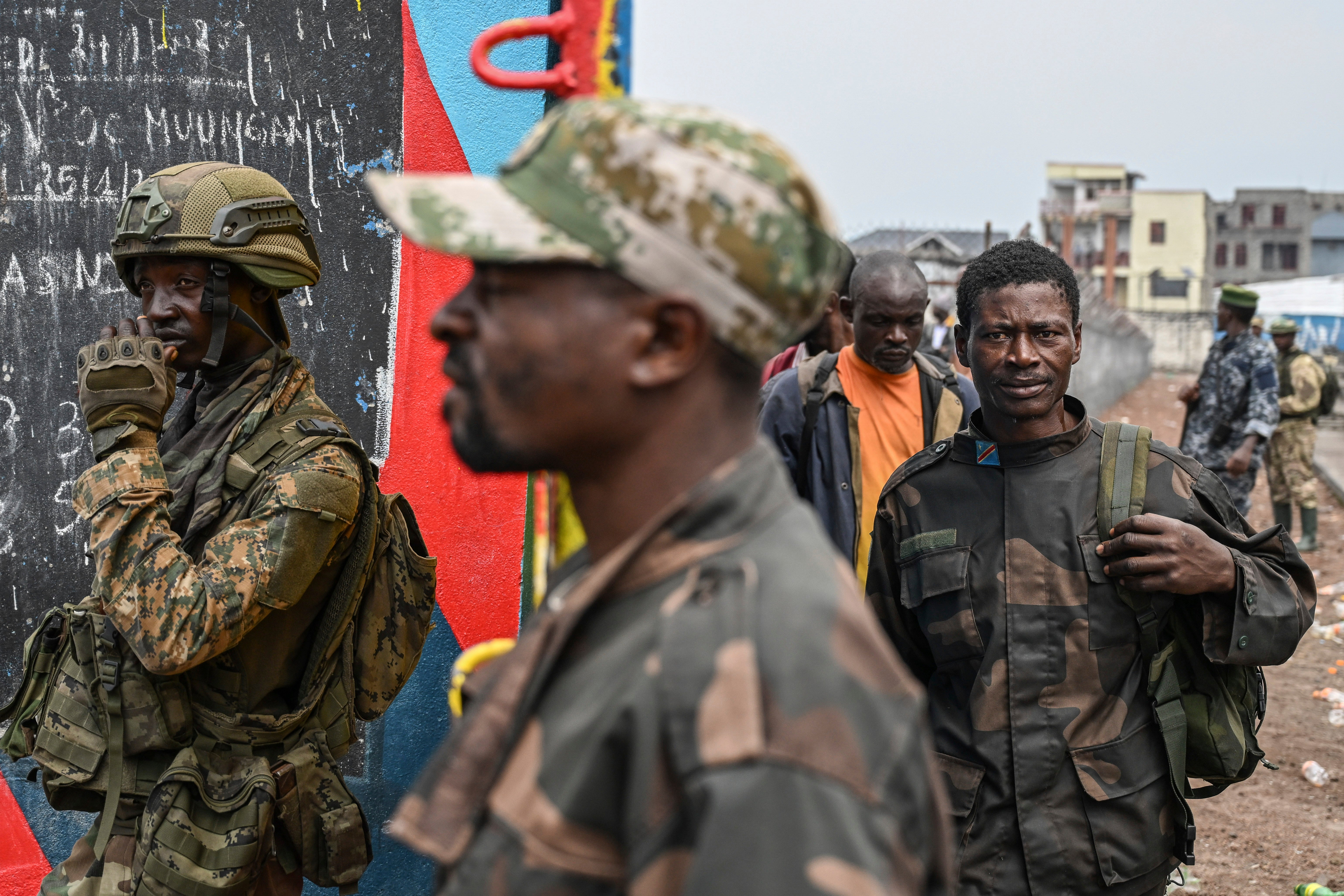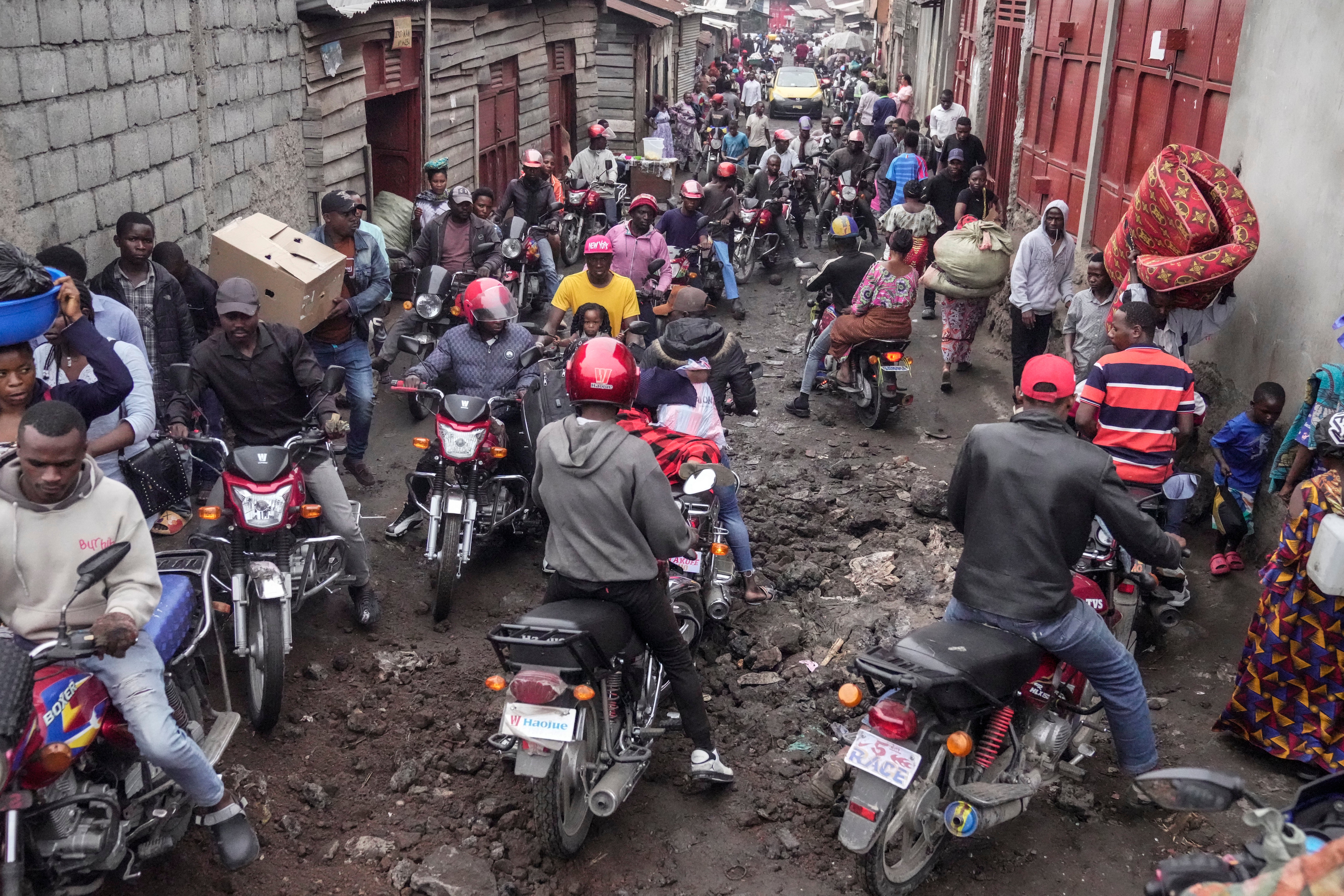
Gunfire rang out across Goma as rebel group M23 marched into the Democratic Republic of Congo’s largest eastern city – in the worst escalation of a conflict lasting more than a decade. Before long they had seized the city and are now looking to push on in their fight against the government.
Faith*, a 42-year-old aid worker hiding away from the fighting in Goma, tells The Independent about life in the city now. “The humanitarian situation is critical,” he says.
“Bodies are all over the city and many are decaying in the streets,” he adds. “Children are dying by the hour. Hospitals are full and those in hospital have no food, no water, and no medication. Medical staff are overwhelmed.”
With the internet cut off to “limit communication”, Faith says people who didn’t manage to escape Goma are struggling to communicate as they were primarily sharing information through social media.
The group’s name, M23, refers to the March 23, 2009, accord that ended a previous Tutsi-led revolt in Eastern Congo. Now, the Tutsi-led M23 are taking arms against the Congolese government, accusing the government of not living up to the peace deal and fully integrating Congolese Tutsis into the army and administration.
The rebels, reportedly backed by Rwanda – although Kigali deny this – have long been funded in part by the illicit mineral trade, with analysts suspecting the “lightening advance” in Congo’s mineral-rich eastern borderlands is set to boost their revenues.
Faith describes parts of the city as “calm” compared to a few days ago, yet people are still staying inside for their security.
“Everything is paralysed,” she says.

However, she adds that displaced people “with no assistance” are scattered on the streets, with nowhere to call home.
The M23 rebels say want to take their fight to the far-off capital, Kinshasa, while Congo's president has called for a massive military mobilisation to resist the rebellion and his defense minister rejected calls for talks.
In a video message, Congo's Defense Minister Guy Kabombo Muadiamvita said he has directed plans for any dialogue with the rebels to "be completely burned immediately."
"We will stay here in Congo and fight. If we do not stay alive here, let's stay dead here," said Muadiamvita. Congolese president Felix Tshisekedi, meanwhile,has called on young people to enlist massively in the military.
At a briefing where they sought to assert their control over the eastern city of Goma and surrounding territory in the neighboring South Kivu province, the M23 rebels said they would be open to dialogue with the government, also proposed by the east African regional bloc of which Rwanda is a member.
Their motive, however, is to gain political power, Corneille Nangaa, one of the political leaders of M23, said during the briefing. "We want to go to Kinshasa, take power and lead the country," Nangaa said. He did not indicate how the rebels planned to advance on the capital, nearly 1,000 miles away.

The DR Congo has been grappling with a decades-long crisis, and in North Kivu, where Goma is located, there are over 2.7 million displaced persons.
Bernard Balibuno, DRC Representative for charity Cafod told The Independent. Balibuno managed to flee from Goma to Kinshasa on Friday when it became obvious that M23 were heading for Goma.
Balibuno is in constant contact with colleagues in Goma.
All the feeder roads are cut off. There is mass chaos,” he says. “It’s catastrophic. There is no electricity in the city, no water. The only information I am getting is by telephone. People are trapped and hiding in their homes.”
Balibuno is hearing that people, especially those with children, only come out of hiding to look for water and food.
Although petrified of the troops, people come out to clap on the groups of soldiers walking through the streets of Goma.
“People are clapping as a sign of saying ‘we welcome you’ and ‘we don’t have a problem with you’,” said Balibuno. “It’s for their safety – to show ‘we are with you’ and ‘don’t want you to shoot us’.”
Balibuno is most concerned for women and girls in Goma. “Now, young girls are lost, going into homes they don’t know, women have no food to give their children, people are sleeping outside, prisoners who were arrested for rape are outside – there is no rule of law,” Balibuno says. “The first victims will be women and children.”
Faith agrees, saying that gender-based violence is “part and parcel” of what women are experiencing in the current context.
Balibuno is asking for “prayer” and for support to save the lives they can.
“We have to blame political leadership in DR Congo, in neighbouring countries and the international community,” he concludes. “The current situation follows months of escalating violence that has led to this moment. Concerted diplomatic action is needed beyond just condemning the violence to get it to stop.”
*Names have been changed to protect identities







